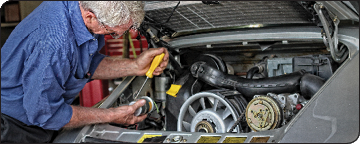Routine Tune-Ups a Thing of The Past, But Oil Changes Are Not

Modern automobiles are truly marvels of engineering prowess. Routine tune-ups have pretty much become a thing of the past. Vehicles now have less-expensive and far-less-frequent scheduled maintenance services. Lower-cost maintenance strategies have been brought on by the Vehicle Cost Savings Act and are great news for car owners.
Automobile manufacturers have taken this low-maintenance feature to use as a marketing tool. The less you need to do to a vehicle, the cheaper it is to own and is, therefore, a better value—right? The answer, like so many things in life, is “not always.” While it is true that engine oil and modern engines have gotten better, there are a few things that haven’t changed.
The way that engine oil is engineered to meet current demands of multi-viscosity and high detergent characteristics is by use of what is called an additive package. Engine oil starts out as a base stock that is the heart of the product. The higher the quality base stock, the potentially better oil you will have. Base stock oil typically has a pretty low viscosity index, like a 5 or 10 weight. The additive package gives the final product its low-wear characteristics and multi-viscosity characteristics. The additive package also carries detergents and anti-foaming agents, as well. The first components to break down in any engine oil are the additives, which then allows the oil to return to its base stock component.
The other thing that happens with oil as it ages is that sludge and other deposits can build up in the engine, accumulating in various nooks and crannies of your engine. As these deposits build up, they start restricting the circulation of engine oil throughout the lubrication system of your car’s engine. Your engine’s oil pump, often correctly referred to as the heart of the engine, has a screen on its pickup tube to catch these particles and keep them from damaging not just the oil pump, but other sensitive components in your engine. The problem arises when too many of these deposits start to collect and restrict this oil pickup. If the pump can’t suck up oil, it can’t deliver oil under pressure, and catastrophic engine damage is inevitable. Just imagine your blood pressure dropping close to zero! Thankfully, unlike the human body, there are warning systems built into automobiles that warn the driver when pressure drops too low. The problem is that cleaning out deposits from your engine can be expensive and difficult depending on how extensive the buildup has become.
The good news is that this condition is completely avoidable by changing your oil more frequently than the manufacturer might recommend. We realize that this sounds counterintuitive, but in fact it is not. Automobile manufacturers are in the business of building and selling new cars, not fixing old ones. Longevity of the product isn’t as big a concern as we consumers might think. After all, if you are selling new cars you might not want a consumer holding on to a vehicle for many thousands of miles. Current manufacturers’ recommendations will easily see a car through its warranty period but not always much deeper into the vehicle’s potential lifetime. Modern engines can last a very long time, but only if the internals are kept in top condition by frequent oil changes. There are virtually only two reasons we typically need to repair a modern engine’s internal workings; timing belt failure due to neglect (another topic entirely) and oil deposits and sludge buildup.
We recommend an oil change interval, using synthetic oil, of 5,000 miles for the majority of our customers. If you only do very short trips while rarely getting the engine fully warmed up, you might want to consider more frequent intervals. Likewise, if you drive your car primarily on the freeway, which are optimal operating conditions, you could potentially extend this 5,000 mile interval. Feel free to discuss your specific driving habits and needs with our experienced service staff.
While more frequent oil changes might cost a bit more on up-front maintenance costs, it is the best money spent on your vehicle. If you do nothing else to your vehicle, changing engine oil will ensure that the most expensive component, your car’s engine, will stay fundamentally healthy.
Tim Pott is a Master Certified Technical Director at ArborMotion.











